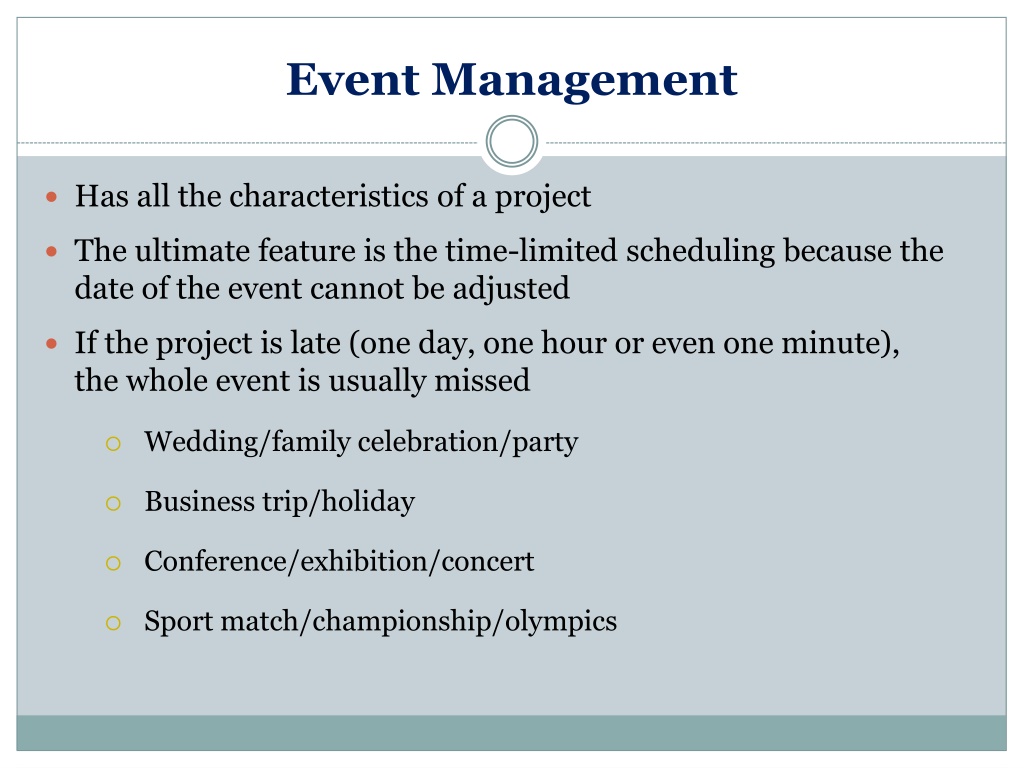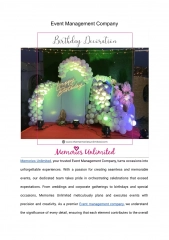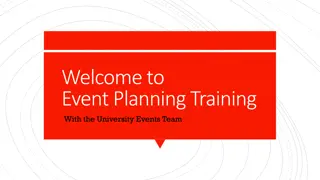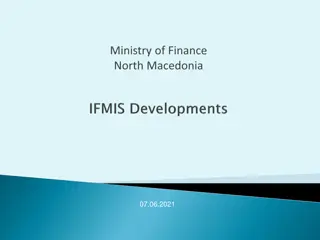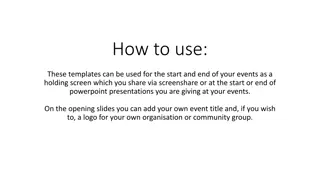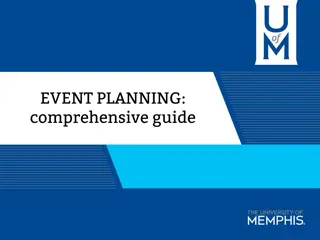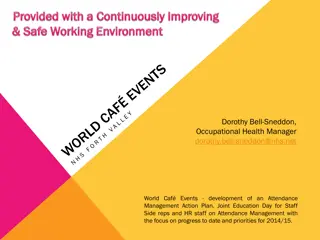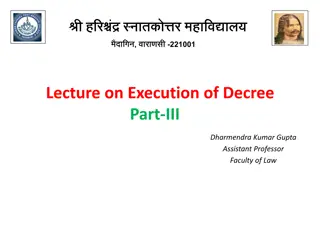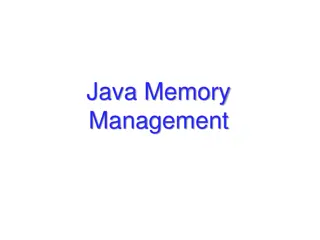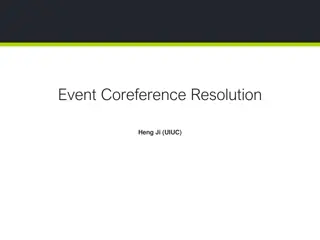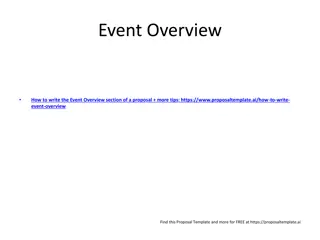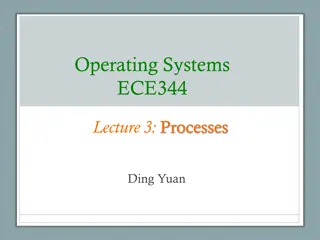The Essence of Event Management: Planning, Execution, and Success
Event management encompasses the strategic planning and flawless execution of various types of events such as weddings, business conferences, and sports matches. With time-limited scheduling being a crucial aspect, the preparation phase is vital before the actual event implementation. Key considerations include answering essential questions, creating work breakdown structures, setting schedules and deadlines, budgeting, risk assessment, and an action plan. Detailed breakdowns and checklists ensure all aspects are covered, from venue selection to outfit choices, while managing responsibilities, resources, and potential risks effectively.
Download Presentation

Please find below an Image/Link to download the presentation.
The content on the website is provided AS IS for your information and personal use only. It may not be sold, licensed, or shared on other websites without obtaining consent from the author. Download presentation by click this link. If you encounter any issues during the download, it is possible that the publisher has removed the file from their server.
E N D
Presentation Transcript
Event Management Has all the characteristics of a project The ultimate feature is the time-limited scheduling because the date of the event cannot be adjusted If the project is late (one day, one hour or even one minute), the whole event is usually missed Wedding/family celebration/party Business trip/holiday Conference/exhibition/concert Sport match/championship/olympics
Event Management There is usually a very long preparation phase followed by a very short implementation phase The ultimate feature is the time-limited scheduling Proper wedding is usually planned several months in advance and it takes one day only Olympic games are being prepared for eight years while the competition phase takes less than three weeks We will utilize the event management to show and explain some further parts of project management
Event Management At the very beginning of any event (project) it is good to answer the following important questions (5W): Why? What is the purpose of the event? Who? Who are the participants or stakeholders? When? The date of the event. Where? The place of the event. What? What are the details of the event and expectations? Based on the answers to the questions listed above we can understand the basic features and the scope of the event.
Event Management Event planning should cover the following issues Work breakdown structure including responsibilities Work schedule and deadlines Costing and budgeting Procurement plans Risk considerations and the relevant responses Action plan of the event management
Work breakdown Wedding Invitation Outfits . Venue Guest list Church Reception Bride Maids Groom Invitations Service Dress Meals Dress Dress Distribut. Rings Shoes Drinks Shoes Shoes RSVP Choir Flowers Hair Hat Speeches Flowers Music Flowers Corsage
Work breakdown It is possible to create the traditional network diagram and to analyze it using CPM, but we will look at it from a different perspective now We will create the event checklist that shows activities and links them with responsibilities, budget, procurement, resources as well as potential risk Activity Responsibility Budget Procure Resource Risk Rings Groom 25 000 Rings --- Forgetting them Choir Bride s mother 8 000 Choir Choir mbrs. Do not come Reception Bride s father 50 000 Catering Waiters Rain/Too hot Music Groom 1000 Dance music DJ Gets drunk
Procurement Procurement is the process of acquiring necessary goods, products and services The procurement schedule must be considered right after the network diagram has been established as it is possible that procurement of some specific items could take a very long time and therefore it could delay the start of the relevant activities Procurement List Date Required Lead Time Order By Date Church One day before wedding 2 months Flowers Two hours before wedding 2 weeks Cars One hour before wedding 2 weeks Hotel/Reception Wedding day 6 months ..
Resource Management Resource management is the process of co-ordinating manpower and machine requirements It is typical that during the preparation phase the manpower requirements are low while the numbers dramatically increase during the event Considering the wedding case, we have to consider the number of cars, drivers, parking assistants, waiters, cleaners, . as well as their availability during the whole event For example, all cars and drivers will be needed during the transportation from the church to the hotel, while less cars and drivers will be needed later that evening (not everyone is leaving at the same time)
Risk Management Murphy's law: "things will go wrong in any given situation, if you give them a chance," or "whatever can go wrong, will go wrong" Good project managers are anticipating risks because there are many unpredictable factors that could influence our event We wish to run everything as smoothly as possible on the day of the event It is normal that there is a real rush on behind the scenes, but we don t want our guests to notice any problem That is why we have to be well prepared and everything should be carefully rehearsed and backed up
Risk Management The objective of risk management is to minimize the chances of project failure Risk management is the process of identifying, analyzing and responding to project risk In order to face the risk we have to Identify risk areas of risk, uncertainties, and constraints Quantify risk in terms of impact as well as frequency Develop response how are we going to respond (eliminate, mitigate, deflect, accept)
Risk Response Risk elimination avoids the risk completely (removing the case, alternative scenarios, reducing the scope of the project) Risk mitigation means reducing the probability of risk and its impact (increased control, more reliable people/technology, reducing complexity) Risk deflection means transferring the risk to another party (by contracting, buying insurance, warranties) Risk acceptance means that you ready to accept the consequences of the risk occurring. However, there are usually some contingency plans (what-if) as well as contingency budget Usually more than one response is under consideration
Risk Management Project (event) risk management table shows how risk can influence the individual activities and the measures that we prepared in order to handle it Activity Responsibility Risk Impact Response Bridal dress Bride Is not ready High Timely fitting, early delivery date Rings Groom Forgetting them High Best man to check it Choir Bride s mother Do not get together Medium Reproduced music Reception Bride s father Rain/Too hot High Contingency plans by catering agency Music Groom DJ gets drunk Low Keep an eye on him, replace him
Event Management Monitoring and Controlling In contrary to general project management where the manager monitors the execution process and has usually many opportunities to take corrective actions, there is no such luxury in the case of event management Event managers have to react immediately when the event is in full swing and that is why it is so important to be prepared and react according to the prepared plans And of course, because something unexpected always could arise, we have to take the opportunity to learn from each event in order to make the next one better
Event Management And finally We must not forget that to close down the event properly Participants have to leave (cars, queues, crowds, safety measures ) The place has to be cleaned and returned to normal All the bills have to be paid It is good to ask the stakeholders and to find out whether we met their expectations We have to learn our post-event lessons to avoid the same mistakes next time
Event Management Altogether We can see that event management is a special kind of project management where especially time considerations are crucial Otherwise the same project management scheme could be followed: 1. Initiation process (event is defined, starting phase) 2. Event planning process (from 5W up to the action plan) 3. Executing process (our big day is here) 4. Monitoring and controlling process (keep it on the track) 5. Closing process (it is over, but not yet for us)
Event Management You are required to organize an event Book or career fair Press conference Concert, conference, fashion show Party or family celebration Sport competition or tournament Teambuilding activity Weekend city break please select a suitable event.
Event Management Discuss and prepare at least a partial relevant work breakdown table, identify the potential risk and suggest the adequate measures in order to cope with that risk: Activity Responsibility Risk Impact Response
Homework Please identify three most widespread beliefs (stereotypes) associated with the nation/culture you are coming from. Can you see some typical Czech stereotypes/peculiarities?
